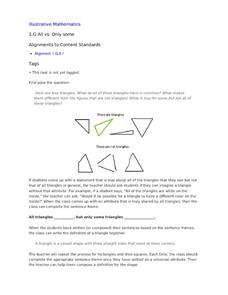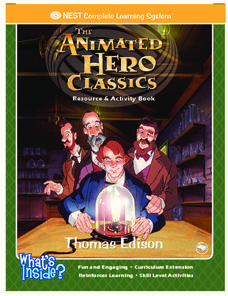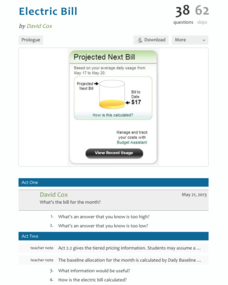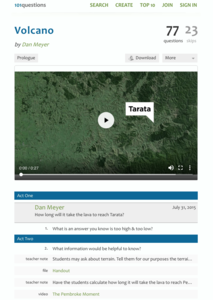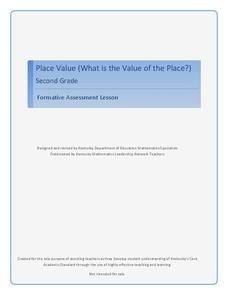University of California
Euclidean Geometry
Go back to where it all began! Investigate how axiomatic systems and Euclidean geometry are based on undefined terms, common notions, postulates, and propositions by examining passages from Euclid's Elements. (Social studies teachers...
PBL Pathways
Do Homework?
To complete homework or not to complete homework ... that is the question. Decide whether it makes a difference on finals by doing homework. Individuals create a scatter plot and find a line of best fit for data on the percent of...
Big Learning
The Antarctica Project: A Middle School Mathematics Unit
Antarctica is a big place, large enough to provide ample opportunities to learn about math. A two-week unit teaches middle school mathematics concepts using project-based learning. The resource covers functions, geometry (area,...
Texteam Geometry Institute
Geometry for the High School Classroom
What does it mean for apples to have chirality? This and other explorations in geometry, such as tiling the plane, boxing a tetrahedron, and investigating Euclid's Characteristic, are included in this resource on Euclidean geometry....
Illustrative Mathematics
The Sign of Solutions
Positive or negative, zero or no solution, are all possibilities for the solution of a linear equation. Here the resource gives examples of linear equations in one variable and their type of solutions. The resource comes with commentary...
Illustrative Mathematics
Placing a Square Root on the Number Line
There are many ways to approach finding the rational approximation of an unknown square root. Here is a problem that will help math learners make a connection between square roots and their order on a number line. As usual, determine two...
Illustrative Mathematics
All vs. Only Some
All shapes have certain defining attributes that set them apart from others. In order to understand this, young mathematicians look at examples and non-examples of triangles, rectangles, and squares, working as a whole class to create...
Mathematics Vision Project
Module 1: Getting Ready Module
This fabulous resource is a must-have for any algebra teacher's arsenal of lessons. Developing the idea of equations and use of variables from basic physical scenarios, learners gain valuable intuition in the structure and meaning of...
Illustrative Mathematics
How Thick Is a Soda Can II?
Science, technology, and math come together in this one combination exercise. Analyzing the common soda can from both a purely mathematical perspective and a scientific angle allows for a surprisingly sophisticated comparison of...
NEST Family Learning
Thomas Edison: Resource and Activity Book
What other inventions was Thomas Edison responsible for besides the telegraph and lightbulb? Incorporate a set of worksheets into your study of Edison and other inventors. The 48-page packet includes all types of activities from word...
101 Questions
Electric Bill
A brilliant resource is at your disposal. Future consumers investigate and discuss an electric bill. Given only partial information, they estimate the monthly bill. They then consider how tiered pricing will affect the bill.
Illustrative Mathematics
Running on the Football Field
Make your class into Pythagorean theorem fanatics in no time. What a great resource to get your sports enthusiasts into the math game! Read the commentary so you can you can strategize how to apply the three math practices.
101 Questions
Volcano
This resource will blow your mind! Young mathematicians estimate the rate of volcanic lava flow by watching a video. They apply the rate formula to determine how long it would take the lava to reach a city. Let's hope everyone gets out...
Curated OER
Place Value - What Is the Value of the Place?
Second graders build number sense in an activity that requires the matching of base 10 representations to numbers. It is the teachers responsibility to gauge student understanding and involvement while class members work in groups.
Achieve
Yogurt Packaging
Food companies understand how to use math to their advantage. Learners explore the math related to the packaging and serving size of yogurt. They then use unit analysis and percent values to make decisions on the product development.
Mathematics Assessment Project
Maximizing Profits: Selling Boomerangs
You'll return to this resource again .. .and again ... and again. Class members determine the maximum profit of a boomerang-making business by solving a system of equations. They then review and analyze provided sample responses to the...
Mathematics Assessment Project
Suzi's Company
Don't use an average resource ... use this one. As a middle school assessment task, learners first determine mean, median, and mode of salaries given in a frequency table. They then investigate how a change in one value changes the...
West Contra Costa Unified School District
Solving Radical Equations
How can you make solving radical equations more engaging? Provide your math class with a hands-on activity that focuses on solving radical equations with flash cards. A warm-up and exit ticket flank direct instruction of the steps...
University of Utah
Rational and Irrational Numbers
Conquer any irrational fears you might have of irrational numbers. As class members investigate how to represent numbers geometrically, they learn about rational and irrational numbers, including approximating and ordering rational...
Statistics Education Web
You Will Soon Analyze Categorical Data (Classifying Fortune Cookie Fortunes)
Would you rely on a fortune cookie for advice? The lesson first requires future statisticians to categorize 100 fortune cookie fortunes into four types: prophecy, advice, wisdom, and misc. The lesson goes on to have learners use...
West Contra Costa Unified School District
Simplifying Radicals – Day 1
It doesn't get simpler than this. Scholars first learn to simplify radicals by determining the prime factors of the radicand. The instructional activity progresses to simplifying radicals involving algebraic expressions in the radicand.
West Contra Costa Unified School District
Law of Sines
Laws are meant to be broken, right? Learners derive the Law of Sines by dropping a perpendicular from one vertex to its opposite side. Using the Law of Sines, mathematicians solve for various parts of triangles.
West Contra Costa Unified School District
Introduction to Trigonometric Functions
Scholars first learn the definitions of the sine ratio, the cosine ratio, and the tangent ratio. After mastering these definitions, they use the new information to solve triangles.
Statistics Education Web
I Always Feel Like Somebody's Watching Me
Future statisticians and potential psychics first conduct an experiment to collect data on whether a person can tell if someone is staring at them. Statistical methods, such as hypothesis testing, chi-square tests, binomial tests, and...








